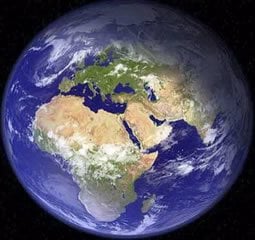What is the significance in the Jewish calendar of the 28th day of the month of Sivan?
To the seasoned Chabad-Lubavitch chassid, the date is immediately recognizable as the day on which our Rebbe and Rebbetzin, of righteous memory, arrived safely in America in 1941, after escaping Nazi-occupied France.
A group of us were recently discussing whether or not this day is something worthy of discussing with those who are not familiar with all of the important dates in the Rebbe's life.
"What is the point?" my friend said, explaining that although to devoted followers of the Rebbe, the date that the Rebbe and Rebbetzin came to America is certainly of great interest, it's simply not a feeling that is transferable. You either care about it or you don't.
Perhaps there is some truth to that. Maybe I cannot and, indeed, need not even try to make the 28th day of Sivan matter to somebody else the way it matters to me. But in case someone is interested to know what it does mean to me, I will try here to explain.

To me, the 28th of Sivan is the sounding the shofar and it's praying Kol Nidre. It's lighting the menorah and it's lighting Shabbat candles. It's sitting in the sukkah and it's sitting at the Seder. It's dancing with the Torah and it's reading the Megillah.
Why?
The 28th of Sivan is my holiday because unlike any of the other days that I as a Jew celebrate, the 28th of Sivan happened here. And by here, I mean the center of my completely subjective universe. The 28th of Sivan is American.
You can call me a cultural bigot, but every aspect of the way I view reality has in some way been affected by my identification with the society and geographical location in which I was born and raised. Western ethnocentrism is embedded into my synapses.
The 28th of Sivan is my holiday because unlike the other days I celebrate, this one happened hereYes, I know that my roots reach far across the ocean and back to rustic, pre-Industrial shtetls in the forests of Eastern Europe, and still further back, to lush Judean hills where Bronze Age shepherds led their flocks to graze in the blessed land that G‑d had promised to their not so distant relative, Abraham. Way down deep, the Jewish collective consciousness that sometimes flickers in my mind can even conjure up images of the storage cities of Egypt where you and I toiled beneath the scorching desert sun and our taskmaster's cruel whip. But, alas, I must admit that I can never be so sure as to what degree these fleeting pictures are faded records of my timeless soul's past journeys on this planet or – as is more likely the case – something produced on some sound stage in California. In the shtetl of my mind's eye, all of the men look remarkably like Topol, and when I recall our bondage in Egypt, Pharaoh somehow reminds me of the King of Siam.
If demographic studies are at all accurate, then there are at least a million, maybe millions more, just like me. The grown-ups tried to deal with our generation by building museums and sending us on summer trips to Israel, symbolic acts that, in the end, only seemed to lend grave finality to the message that authentic Jewish culture and heritage were indeed only to be found somewhere either eastward in space or backward in time. At times, that message faded into nothing but the nearly inaudible siren song of nostalgia whose magnetic pull we implicitly understood was a sort of reverse Manifest Destiny, retreating back away from the future and back away from the direction of the promise of the setting sun.
Nearly one thousand years ago – half way through our present exile – Judah HaLevi gave his sorrow the form of verse as he wrote: My heart is in the East, while I am at the ends of the West. Ah, the classic lament of the Diaspora Jew, a persona that is curiously fragmented through conditions of geopolitics. And yet, I do not relate as I think I should. First of all, in HaLevi's world, Toledo, Spain, (where he lived) could be referred to as the "ends of the West"—the western end of the Mediterranean basin, that is. In my world, even educated Midwesterners are apt to speak of Toledo, Ohio, as being "out East." Second of all, with all honesty, my heart is not in the East. Me and my heart are right here in the West—so much so that I don't even consider it unless I have cause to reflect upon it as I do right now. The best I can say for myself is that my soul has spent all of its lifetimes – but for this present one – hanging out in the East. I can say that my spiritual past – in the sense that my spiritual past transcends the corporeal me – has been for the most part a story of the Orient and not of the Occident. But these metaphysical considerations notwithstanding, I am so estranged from my Easternness – and ostensibly also then from my culturally authentic Jewishness – that I am perfectly happy to have been born and raised in America. And yet, I am somewhat conflicted about the fact that I do not feel homesickness for the old Jewish corner of the globe.
Half the world's Jews live on the opposite side of the planet as almost every single one of their ancestorsI am conscious of the fact that I am part of an historical anomaly. I have grown up in a strange reality where half the world's Jews live on the opposite side of the planet as almost every single one of their ancestors.
In the nearly four thousand years since our father Abraham was born, a lot has happened to us. But as much as we wandering Jews have wandered, it has all basically been within a very tiny radius of our homeland. Consider that for the first several centuries of exile, most Jews lived in Babylonia, present-day Iraq. From Israel to Iraq is like from Los Angeles to Phoenix. Yes, it's a long way to go without a car, but it's not the other side of the earth either. Even as time went on and the Diaspora became increasingly expansive, most of us were still in the same basic part of the world. Whether your family comes from Poland or Morocco, Yemen or Lithuania, your ancestors never resided anywhere other than what in modern terms can most conveniently be described as a three hour flight from Tel Aviv.
I'm not sure if they were trying to be whimsical or earnestly didactic, but when we were kids, grown folks used to tell us that if we dug a hole deep enough, we would come out the other end in China. You see, because, China is supposed to be on the other side of the earth. If you're on the West Coast of the United States, however, China is only nine time zones away while Israel is ten.
There's actually a technical term for "the exact opposite side of the Earth." It's called an antipode. In Britain, they still sometimes refer to Australia and New Zealand as the Antipodes and to its inhabitants as Antipodeans.
Now I bet you're wondering—what is the antipode of our holy land? If the Land of Israel is the epicenter of Jewishness in the world, then where is its polar opposite? I checked it out. It's somewhere in the middle of the Pacific Ocean near American Samoa. Now, imagine a globe that is tilted so that instead of the North and South Poles being at the top and the bottom, Jerusalem is on the top and its antipode on the bottom. You'll get a whole new perspective of Earth. When Jerusalem is the top, then Africa, Europe and most of Asia are in the "Upper Hemisphere," while North America becomes just as much "Down Under" as Australia. In historical terms, what the explorers called the "Old World" is on the top, and what they called the "New World" is on the bottom.

So here we are, hanging off the bottom of the Earth, living on what is basically the opposite side of the planet from where the Holy Temple once stood; the opposite side of the planet from where our prophets once lived; the opposite side of the planet from where G‑d gave us the Torah. My revered master, Rabbi Judah HaLevi! Please, consider: Toledo, Spain, is a one hour time difference from the Holy Land whereas if I want to call a business in Israel, I have to do so no later than 9 or 10 in the morning or they will be closed for the evening! I ask you, which one of us is at the "ends of the West"?
I have not yet really made my point, though. But that is only because I am a bit ashamed to say it so bluntly. If it were not for what happened on the 28th of Sivan (June 23), 1941, I'm not really sure where my conscious connection to my Jewishness would have come from. If my Jewishness lies over the sea, I am scared to think what would have become of me.
Oh, I am not so egocentric as to think that the Rebbe came to America just for me, but couldn't it be that he came here for millions more just like me?
Over the years, the Rebbe was asked many times why he did not move to Israel and bring his followers with him. The bottom line that the Rebbe invariably gave was that he could do more good for the Jewish people if he lived here in America. You might try to play a numbers game and say what that means is that the U.S. is home to the largest population of Jews, but it's simply not so. The U.S. is home to about 40% of world Jewry and so is Israel. The other 20% are almost exactly evenly divided over both the Upper and Lower halves of the world—for Britain there's Argentina; for France, there's Canada; for Russia there's Australia, and so on. You can look up the numbers some time if you wish.
It's the day that Antipodean Jews were given a chance for spiritual survival down here on the bottom half of the planetI am repeatedly amazed each year at the International Conference of Chabad-Lubavitch Emissaries, when the Rebbe's emissaries get together to form the single greatest assembly of Jewish teachers, activists and scholars in the world. And where do they gather? In New York! From a historical perspective, it's absolutely mind-blowing. When Moshiach comes and we are reunited with our ancestors, ask your great-great-grandfather if he's ever heard of New York!
To hear me talk, you might think that I am trying to sound like a real chassid. I wish that I were. But if I were, then I'd probably be writing about the 11th of Nissan which is the Rebbe's birthday or the 10th of Shevat which is the day that the Rebbe openly accepted the role of rebbe.
But my holiday is the 28th of Sivan, because that's the day that Antipodean Jews like me were given a chance for spiritual survival down here on the bottom half of the planet. And not just to survive, but strangely enough, to feel like we are at the center of things! To be at the forefront of bringing Redemption to the whole world—even the upper half of the world. It reminds me of what the Rebbe once said – I believe it was at a gathering one year on the 28th of Sivan – when you lift up a building, you've got to pry it up from underneath.







Join the Discussion